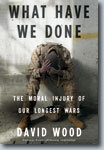

What Have We Done:
The Moral Injury
of Our Longest Wars
In his book What Have We Done, David Wood writes beautifully and harrowingly about the consequences of
the wars in Iraq and Afghanistan. With many moving stories about individuals who served in those conflicts, he
brings modern warfare to life at a deeply personal level, and also discusses the consequences at a national level,
in terms of the ethical fallout for the United States as a whole.
Wood has a keen moral conscience as well as an astute eye for detail and a great ability to tell a story. The
individuals he portrays so vividly come to life in this book as three-dimensional human beings. Most importantly,
he names what they struggle with most deeply as �moral injury.� An issue that is too rarely discussed, moral
injury is one of the primary difficulties that returning veterans have to battle. Distinct from both physical
injury and from psychological injury (i.e. PTSD), moral injury occurs when a person violates his or her own
conscience and cannot recuperate easily afterward.
The author shows how our military and our society as a whole fail veterans by neglecting to assist in their
struggle to heal from the moral injuries that inevitably result when we ask them to act in a way that would be
seen as abhorrent were it to take place outside of the theater of war. Wood movingly depicts how men and women
sent to the two conflicts in the Middle East have come home crippled by guilt and how we have failed to assist
them in healing. Readers will come away thinking about war and returning home from war with an entirely new
perspective.
- Helen Thorpe and Alan Taylor
2017 finalist judges
* * *
Excerpt from the book
�Each of us, of course, has experienced at least a twinge of moral regret and sometimes
deeper and lasting moral injury. History is marked by immense human calamities and periods
of unspeakable moral violation. Yet the moral jeopardy of war, especially in the wars the
United States began and fought in Iraq and Afghanistan, is different. These wars demanded
the intense and prolonged participation of a tiny fraction of the nation�s youth in sustained
campaigns built on the intentional violation of the ancient sanctions against killing.
Those who returned did so without the healing rituals of cleansing and forgiveness practiced
by past generations. Threads of anger and betrayal run through their stories: violations of
their sense of �what�s right� by the Afghan and Iraqi civilians who turned violently against
them, by an American public that turned its back on the war, and by the lack of clear victories
in Iraq and Afghanistan that might have justified their sacrifices.�

|